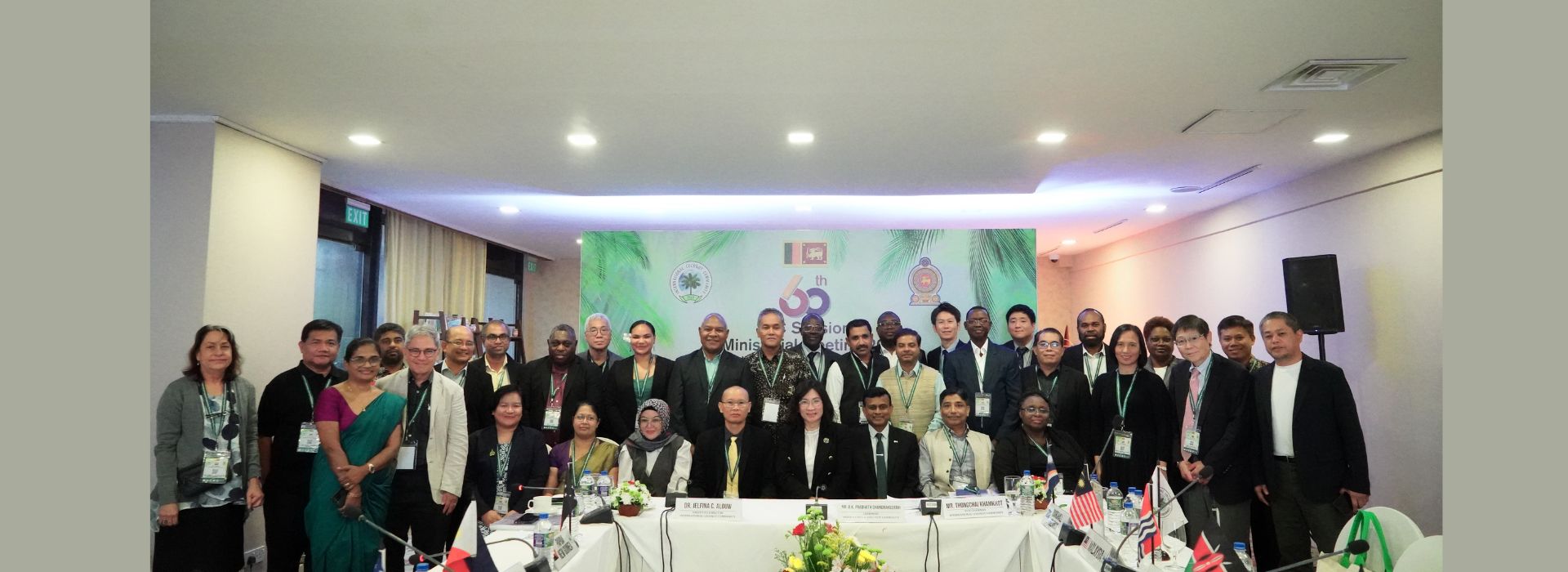COLOMBO, Sri Lanka – The third day of the International Coconut Community’s (ICC) 60th Session and Ministerial Meeting centered on strategic planning, collaborative action, and addressing the challenges and opportunities facing the global coconut industry. The day featured insightful reports and presentations from key committees and working groups within the ICC.
Technical Working Group Charts a Course for the Future Mr. Benjamin Madrigal, Chairman of the ICC Technical Working Group (TWG), presented a comprehensive report outlining the group’s activities and achievements. The TWG focused on harmonizing efforts within the ICC, enhancing its responsiveness to industry needs, and setting the global direction for the coconut industry.
Key challenges addressed by the TWG included the impact of the pandemic and the Ukraine war, competition from other vegetable oils, addressing concerns about coconut oil, climate change mitigation, and improving farmer welfare.
The TWG achieved significant milestones, including revising the ICC’s mission and vision, updating its five-year strategic plan, and actively participating in international coconut conferences. Ongoing efforts focus on integrating programs and projects, developing key measurement areas, and enhancing evaluation mechanisms.
Scientific Advisory Committee on Health Tackles Misinformation Dr. Fabian Dayrit, Chairman of the ICC Scientific Advisory Committee on Health (SACH), presented a SWOT analysis of coconut products in relation to health. He highlighted the strengths of coconut in offering numerous health products but acknowledged the challenges posed by misinformation and the need for more research and advocacy.
Dr. Dayrit proposed strategies to counter misinformation, including publishing scientific papers, engaging with health ministries and medical societies, and addressing popular press and social media. He emphasized the importance of collaboration among researchers, health professionals, and the media to effectively communicate the science-backed evidence and support the coconut industry.
COGENT: Conserving and Utilizing Coconut Genetic Resources Mr. Aluthwalahewa Nuwan Chinthaka, Assistant Director, presented a report on the International Coconut Genetic Resources Network (COGENT). COGENT promotes international collaboration on coconut genetic resources, facilitating the exchange of germplasm and supporting research and development.
The report outlined COGENT’s structure, activities, and proposed future direction, emphasizing the importance of gene bank strengthening, sustainability, research and development, and capacity building. Challenges such as funding limitations, engagement of National Focal Points, and biosafety risks were also addressed.
Executive Director’s Insight: Towards Sustainability and Resilience Dr. Jelfina C. Alouw, Executive Director of the ICC, provided insights on the global coconut sector, emphasizing the need for sustainability and resilience. She highlighted the industry’s challenges, including plateauing production, pests, diseases, and climate change, and outlined strategies for achieving resilience, such as diversification, improved farming techniques, and expanded market access.
Dr. Alouw emphasized the importance of strengthening global partnerships, empowering farmers, investing in innovation, and expanding market access to achieve a sustainable and resilient coconut industry that benefits millions of stakeholders worldwide.
The day also marked the ceremonial handover of the ICC Chairmanship from the Secretary of the Ministry of Plantation and Community Infrastructure, Mr. Prabath Chandrakeerthi to DR. WILAWAN KRAIKRUAN. The handover was physically represented by Mr. Thongchai Khamkhot from Thailand. Discussions focused on restructuring the ICC Secretariat to improve efficiency and clarity, with proposed adjustment to titles and responsibilities. In line with UN practices, the title of Executive Director has been changed to Director General, and the Assistant Director to the Deputy Director General. Professional staff and officers will now be referred to as Directors.
Furthermore, the meeting addressed the tenure of the Director General, which will be increased to four years, aligning with the standard practice in other UN organizations. This change aims to provide greater stability and continuity in leadership, allowing for more effective implementation of long-term strategies and programs.
The ICC Session concluded with the announcement that the next session will be held in Thailand in November 2025. The event ended with a symbolic handover of the ICC chairmanship from Sri Lanka to Thailand, marking a new chapter in ICC leadership.






